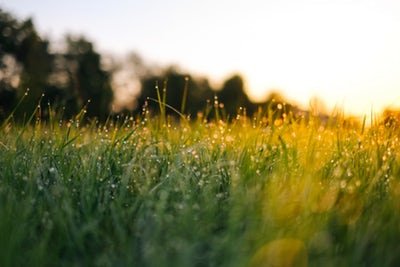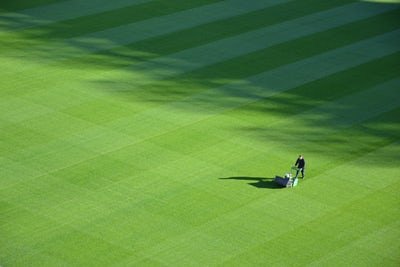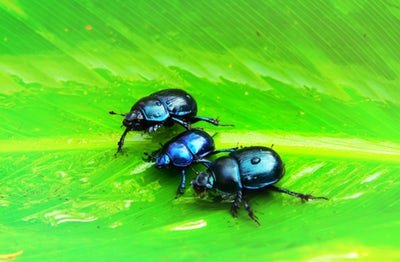Curmudgeonly Rambling: Lawns, Vanity, Waste, and Poison

Several years ago, one of the local news stations in the city that I was living in aired a series of "reports" that were designed to shame residents into improving their yards. It was called "Eye Sores" or something of the like. Essentially, they had their crews drive around and film houses with messy or unkempt yards on slow news days. They aired the pictures and patted themselves on the back for their "service" to the community. In reality, they ended up targeting the poor and the infirm and blasting pictures of their homes across thousands of T.V. screens while viewers watched and made shallow judgments about people whom they did not know. One could likely make a "social justice" argument in regards to that incident and it would be valid. However, I want to primarily focus on the harmful effects associated with our obsession with landscaping and the "price" that comes with the desire to keep one's yard looking good. With the exception of things that cause legitimate safety and health hazards (like dumping raw sewage on a driveway or allowing an infestation of disease carrying rats to take hold) or the need to clear obstructions, people's concern with the appearance of their yards or the yards of others is largely based on nothing besides the desire to look like an arbitrary "ideal" and serves no real purpose. Sometimes neighbors and cities organize to force people to care for their yards in the way that they deem to be "acceptable." There are, obviously, problems with this state of affairs. Vain desires to keep these patches of dirt covered in neatly trimmed emerald colored grass comes with some severe costs. People who live in water starved environments are driven by themselves or compelled by others to pour the scares resource onto the ground. Often water in not enough and potently dangerous, polluting, herbicides are employed to control weeds, the poor, elderly, and ill are disproportionately burdened by our society's obsession with yards, and people's freedom to govern their own property is infringed. To put it simply, shallow concerns about the appearance of lawns puts unnecessary stress on individuals, their rights, and the environment while serving no tangible purpose.

A homogeneous field of green grass looks very nice and it is not surprising that it is considered by many (in this country, at least) to be the "ideal" appearance for their patch of property. However, having a beautifully manicured lawn has very little in terms of real effects. The grass sits around looking nice and doesn't do much else. That would be fine if it just grew on its own but that is often not the case. The climates in this country vary wildly from one location to another and many of them are not well suited for growing grass without human intervention. Given the lack of function associated with possessing a pretty yard, it would seem that the only real benefit to be gained from having a nice lawn is that it tickles of the pride of the owner or the community but one must wonder if the costs (to the individual and to the environment) are worth such a small reward.
I live in the desert and we are continually told that, as the population grows here, our water consumption will eventually become unsustainable but people are still compelled (either by themselves or by other entities) to dump that water onto the ground in a wasteful (and often futile) attempt to raise grass on land that is better suited for growing cacti. This may not apply to people who live in places where it rains but it is their same "ideal" that drives the behavior in regions like this. I would never tell someone that they can't grow grass but it seems somewhat selfish, if it is a matter of their own desire to look good and it is irresponsible, if it is forced by city ordinances or neighborhood associations. We need that water, the native plants and animals need that water, the crops that feed us need that water and, that being the case, it is frustrating to see people running their hoses and sprinklers for no real reward.

Regardless of which environment a person lives in, water is sometimes not enough to ensure that one has the beautiful lawn that they desire and potentially poisonous chemicals are employed to maintain their "ideal" appearance at the expense of the health and safety of the environment. Weeds, bugs, and poor soil can plague someone who aspires to have a nice yard and they may choose to find chemical solutions. Roundup takes care of the weeds, pesticides can do away with the grubs and beetles, and chemical fertilizers can help to feed the grass but many of those things are toxic. There is compelling evidence to suggest that Roundup causes cancer. I would suspect there are similar problems with other herbicides and pesticides. To me, those things seem awfully harmful to put into the environment given the minor reward that they help to generate. "All the birds that land on my property die but my grass looks great." Those chemicals don't confine themselves to the users property either. They bleed out when it rains. The fumes blow into other people's yards and homes. They make their way into the ground water. Like wasting resources, this practice of using these sorts of products to grow nothing but grass seems a bit irresponsible.

As I have already alluded to, sometimes, it is not always personal pride that drives people to put undue focus on their yards. Personal vanity keeps some individuals freely contributing to the costs of lawn care but many others are forced to engage in the practice. Some cities will fine residents who do not maintain their yards to satisfactory standards. The force of law is used to make us pollute the environment, spend money on corporate produced poison, and squander limited resources on superficial appearances. There are also neighborhood associations that will dish out shockingly severe punishments to members for not adhering to lawn standards. At any rate, these sorts of rules, ordinances, and laws are bad policy regardless of who the one enforcing them is because they are based on vain ideas about what an "ideal" yard should be and they infringe on the right of an individual to govern his or her property as he or she sees fit. The city governments or neighborhood associations want to be able to take shallow pride in appearances and messy properties make that more difficult for them to do. Personal vanity is replaced by collective vanity, in this case, but it is still vanity.

Often, compulsory lawn care places an unreasonable burden on the weakest among us. This is a secondary cost that few consider when this issue is discussed. Having the time, money, and psychical capacity to maintain a yard is a luxury that not all people possess and this kind forced lawn care seem like an instance of the privileged few punishing people who are not as fortunate as them. A person in a low paying job must work long hours to survive and likely lacks the time to care for his or her own yard and he or she cannot afford to hire a gardener to do the work. If someone is old or sick, they may be too frail to do the work and they potentially have the same financial limitations as the low income worker. Due to their hardships, these people are more likely to let their yards become unkempt and are hit by fines which only worsen their adversities.
We can be friendlier to the environment and be "lazy" at the same time. Assuming that we aren't being forced maintain our property to someone else's standard by some anti-freedom policy, we can find something else to take pride in. I like the way grass looks but it is not worth the trouble that it brings. Since this is the desert, it only seems right that my yard is allowed to be part of that desert. I still knock down the weeds and pick up the dog shit but I don't water, I don't use chemicals, and I don't try to bend the environment to my ideals. I can't take pride in the appearance of my patch of dirt but I don't hurt anything by letting it be a patch of dirt. To me, putting less effort into the appearance of one's lawn is a win win scenario. There is less work to do and our impact on the environment in reduced. I know that this isn't the biggest issue facing humanity but it is one that an individual can improve with no finical or temporal cost. Not doing unnecessary yard work is free and it takes no time. Slacking off is something that everyone is good at.
Peace.
All the images in this post are sourced from the free image website unsplash.com
I don't know if you've ever seen a show that Penn and Teller did a few years ago called Bullshit but they do an episode on lawn upkeep in season 7. If you haven't seen it I would recommend it.
The dog of mine that died of cancer in February, Loki, we figure contracted his lymphoma from sticking his big nose into leaves freshly sprayed with Roundup. The supermarket near my house sprayed the weeds around it and didn't bother to put up signs to warn the neighborhood. The next week or two after he jumped around those plants and gave the plants a heavy-duty go over with his nose, the plants started dying. My wife and I noticed and thought, "oh shit" since the dog we had before him had died at 15, but rather quickly and we suspected it was the spraying that the supermarket did. For our previous dog, she was old, so we didn't bother to have her illness diagnosed by a vet, but we kind of figured it was cancer. As a result, we tried to keep Loki out of the plants growing by the supermarket, but he was very demanding and insisted of getting his nose into the greenery before we could stop him.
Anyway, when I read about the gardener who sued Monsanto and won his case, it reminded me of Loki since he also had Lymphoma like the guy who sued Monsanto. I used to live on a farm and back in the 70s we were using Roundup on our fields, and even then, there were numerous studies that linked it to cancer. At the time, I periodically got into arguments with my older brother and father concerning the heavy use of chemicals on our fields. Perhaps, the biggest reason I did not become a farmer was my aversion to the insane acceptance of corporation-produced chemicals by the average farmer. Yep, "slacking off is something" that may be a lot better than the alternative.
Yeah I worry about that stuff. They used to spray excessive ammounts of roundup at the college that I was going to it would reek of it for days. Then they turned around and banned smoking because it was "dangerous" for our health.
Yeah I heard about that guy. The company was still trying to deny that their poison is poisonous though.
Denial is possible as long as it's profitable. I guess when considering the excessive amounts of roundup that's been used worldwide - the profits will continue for a long time until many more of us peons die on the vine.
Its insane isnt it, even in europe in Germany , i had a "city garden" like a big alottment with a cabin on it. I started to get complaints as my garden was full of "piles of trash" as said from the garden committy.. I was making a "hugel beet" garden for food and had taken up all the lawn for space to grow edible stuff aswell, and the concidered permaculture (heaps of natural materials) to be trash hahaha. I left the place half done and went somewhere else. They expected lawns and pritty flowers hahaha wtf!
The Colective Ego. Hey before I forget, did you know that a man won in court against round up causing his cancer?!
Yeah I had that in my mind. I think that the evidence is pretty clear about round up but the last thing that I heard was that the company was still trying to deny the claim.
I get the appeal of having the a nice yard but it is not worth the trouble that it causes. I have stamped concrete in the front now and dirt and a few bushes that can grow naturally in the back but I still see a lot of people running water in an attempt to fight the environment.
So true. What's in this order and control? Nature is a beautiful chaos anyway.
I think I won't be able to live in a place with too many rules. Here I am already complaining about too many rules too. It's happening everywhere.
A uniform, well kept lawn serves a specific purpose. It demonstrates the conformity of the resident citizen.
A good well behaved citizenry keeps their lawns neat and uniform. A misbehaving citizen allows his lawn to fall out of uniform. A wildly deviant citizen, one who may be "a danger to the social order", allows his lawn to fall entirely out of the norm. (Perhaps by planting a garden, or allowing a natural meadow to grow there.)
The "problem" of the social deviant is solved by using legal measures to either force him to conform or to eventually evict him from the neighborhood. What the government does not want is people falling out of line with the officially designated social norms. Manicured lawns is one way they can effectively measure compliance, and it is a warning sign of a potential deviant. It is one way they monitor and control society.
I upvoted your post.
Keep steeming for a better tomorrow.
@Acknowledgement - God Bless
Posted using https://Steeming.com condenser site.
@artisticscreech, go and place your daily vote for Steem on netcoins! http://contest.gonetcoins.com/